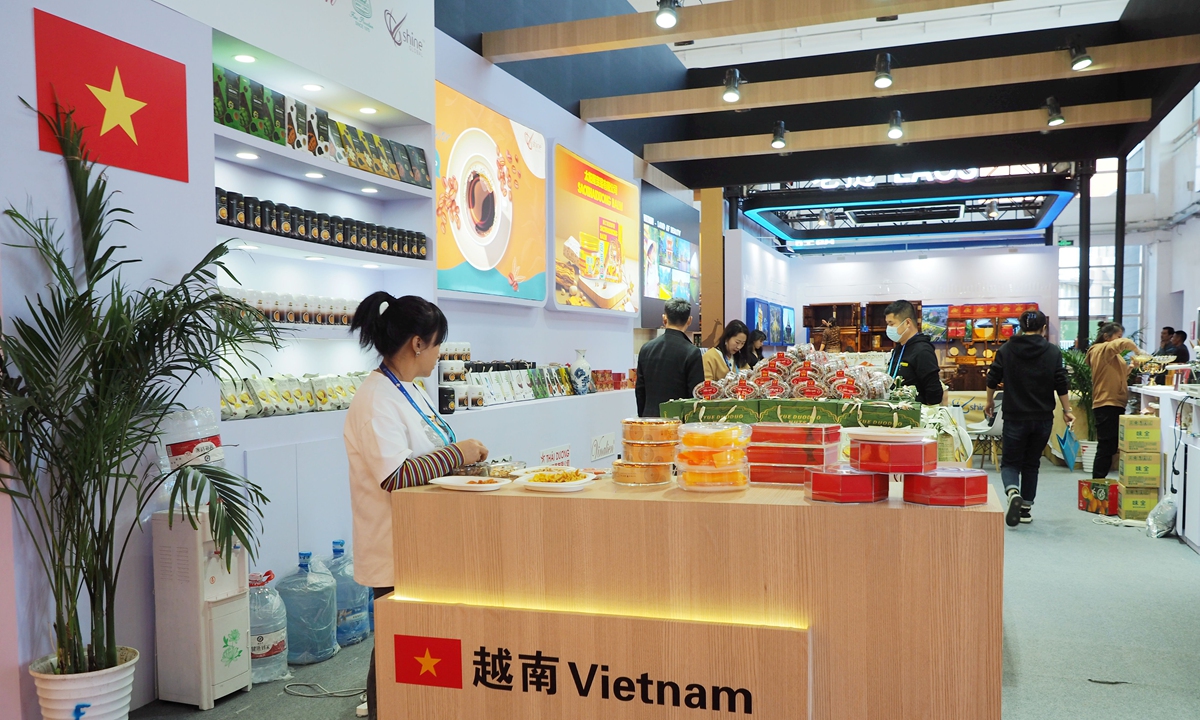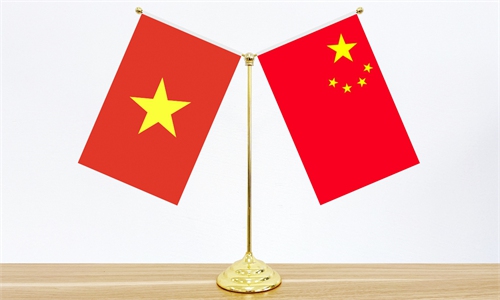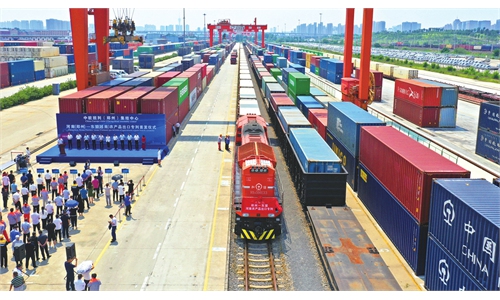
Visitors choose goods at the Vietnam booth at the China International Supply Chain Expo held in Beijing, on November 28, 2023. Photo: IC
China-Vietnam bilateral trade last month hit a monthly record of 161.92 billion yuan ($22.58 billion), up 12.5 percent year-on-year, Chinese official data showed on Tuesday, thanks to closer structurally complementary economic cooperation.
Chinese President Xi Jinping started his state visit to Vietnam on Tuesday with the aim of boosting bilateral ties and cooperation, according to the Xinhua News Agency.
During the two-day visit, the two sides will discuss upgrading China-Vietnam relations and work to deepen and substantiate comprehensive strategic cooperation, Chinese Foreign Ministry spokesperson Wang Wenbin said earlier.
Economic and trade cooperation between China and Vietnam has yielded fruitful results due to structural complementarity, and the two countries are eyeing deeper cooperation in the fields of new energy and the digital economy, experts said.
China-Vietnam cooperation has provided a model for regional cooperation, which focuses more on mutual benefit and offers a vivid example to oppose "decoupling," they noted.
As this year marks the 15th anniversary of the comprehensive strategic cooperative partnership between China and Vietnam, bilateral trade has maintained strong growth momentum.
According to China's General Administration of Customs, bilateral trade reached 1.45 trillion yuan in the first 11 months, up 3.6 percent year-on-year. China-Vietnam trade accounts for 25 percent of China's trade with ASEAN.
Trade in intermediate products stood at 1.01 trillion yuan, accounting for 69.8 percent of the total. China's imports of Vietnam's agricultural products jumped by 20.3 percent to 44.62 billion yuan.
"Cooperation in traditional areas including agricultural products, infrastructure construction and raw materials reflects the highly complementary nature of economic and trade cooperation between China and Vietnam," Xu Liping, director of the Center for Southeast Asian Studies at the Chinese Academy of Social Sciences, told the Global Times on Tuesday.
Xu noted that China has a wide and vast market, and most of Vietnam's agricultural products, including durians, are exported to China, benefiting Vietnamese farmers. In addition, China provides cost-effective raw materials for Vietnam's processing and manufacturing sectors.
"Structural economic complementarity has brought tangible benefits to the two sides, in addition to a natural geographic advantage in logistics and transportation," Xu said.
Apart from traditional areas of cooperation, more Chinese enterprises have entered Vietnam's photovoltaic (PV) market in recent years, and the largest overseas PV industry cluster that Chinese businesses have built to date is in Vietnam.
China's leading solar company Trina Solar plans to build a new factory in Vietnam, according to media reports. The plant will cover 25 hectares of land and the investment is expected to be $400 million. The company will not only invest in the construction of production facilities in Vietnam, but will also directly participate in solar power projects in the country, according to reports.
"Chinese PV companies power the sustainable development of Vietnam, as the country lacks electricity," Xu said, noting that there is also vast room for bilateral cooperation in the digital economy, smart cities and e-commerce.
Tourism and people-to-people exchanges have a long history. Over the past decade, both countries' tourism markets have become larger, Xu Xiaolei, a marketing manager at China's CYTS Tours Holding Co, told the Global Times on Tuesday.
Xu Xiaolei noted that in the post-pandemic era, inbound tourism from Vietnam to China has seen rapid growth, especially in China's southwestern regions like Yunnan Province.
"With the reopening of China's inbound tourism market and the launch of favorable policies, we are very optimistic about people-to-people exchanges, which I believe will definitely add new impetus to the economic cooperation of the two countries," the travel agency manager said.
China-Vietnam cooperation actually provides a model for regional cooperation, which does not target a third party, focuses more on mutual benefit and opposes "decoupling," Xu Liping said, noting that enhanced bilateral collaboration has injected stronger impetus into the recovery and growth of the global economy.



